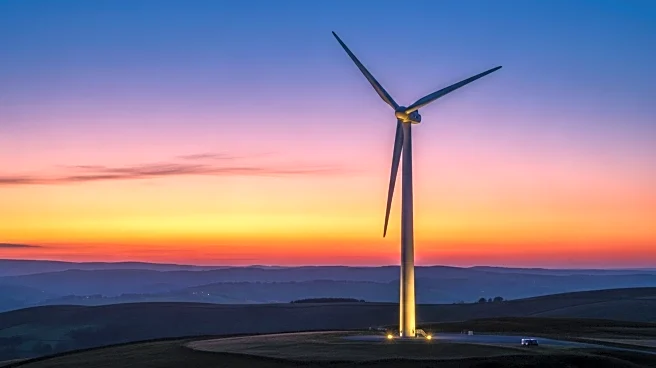What is the story about?
What's Happening?
Cumbria, along with its partners in the North West, is set to play a pivotal role in the UK's clean energy transition. The recently published North West Clean Power Report forecasts significant investment and the creation of 35,000 new clean energy jobs by 2028. Cumbria's councils are positioning the region as a global leader in clean energy innovation and industrial decarbonisation, aiming to attract new businesses and boost long-term economic growth. The report anticipates the forthcoming Local Power Plan by Great British Energy, which will empower local authorities and communities to own and operate renewable energy schemes. Key projects include Pioneer Park, Barrow Green Hydrogen, Workington Port Clean Energy Hub, and Morecambe Net Zero, all designed to accelerate decarbonisation and high-skilled job creation.
Why It's Important?
The clean energy transition in Cumbria is crucial for reducing emissions and creating economic opportunities. By diversifying the local economy beyond its historical reliance on the Sellafield site, these initiatives promise to attract investment, grow the economy, and deliver high-quality jobs. The report highlights the potential for the North West to become a national hub for green innovation, offering benefits such as lower energy costs, supply chain growth, and increased competitiveness. The private sector is expected to play a significant role in driving this transition, with substantial investment opportunities identified in onshore clean power projects, power distribution networks, offshore wind, and nuclear R&D.
What's Next?
The North West Clean Power Report sets the stage for Cumbria's clean energy ambitions, aligning with the region's Going for Growth Strategy. The development of energy hubs at Workington, Moorside, and Barrow will be central to driving investment, innovation, and energy security. As these projects progress, they are expected to attract global investment and create high-skilled local jobs, positioning Cumbria at the heart of the UK's net zero transition. The report serves as a foundation for turning clean energy ambitions into actionable plans, with local councils committed to net zero initiatives that protect landscapes and support local communities.
Beyond the Headlines
The clean energy transition in Cumbria not only addresses environmental concerns but also presents ethical and cultural dimensions. By fostering community-owned renewable energy capacity, the initiatives promote energy resilience and community wealth building. The focus on sustainable aviation fuel production and carbon capture and storage projects reflects a commitment to long-term environmental stewardship. These efforts align with broader societal goals of reducing carbon footprints and enhancing energy security, while also supporting local economies and preserving natural landscapes.
















